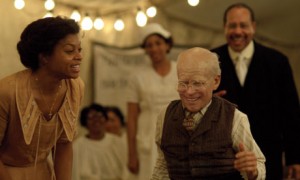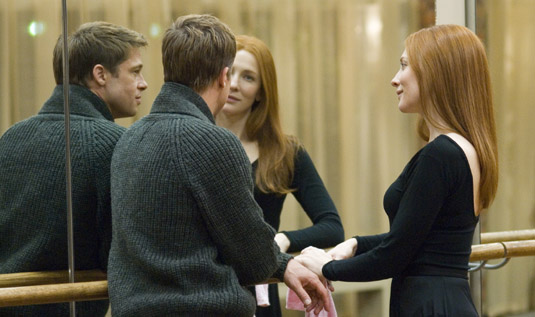Oscar Week: The Curious Case of Benjamin Button (Ryan’s Take)
The Curious Case of Benjamin Button wants an Oscar. It’s a movie tailor-made for the Academy. The main character goes on a journey of self-discovery, meeting every stripe of colorful supporting character along the way, and becoming entangled in a passionate, though ultimately tragic romance. Many have called it Forrest Gump 2 and I find it hard to argue.
However, in Forrest Gump the message was: “Look at how incredibly impactful the life of one man, especially one of such inauspicious beginnings, can be on the world around him.” Whereas the much more simplistic message of Benjamin Button is: “Isn’t love both wonderful and sad? Also Brad Pitt ages backwards.”
That’s the gimmick, if you hadn’t heard. Benjamin, played by Pitt, is born a (tiny) old man and grows younger as the years go by. He falls in love with Cate Blanchett’s character Daisy when they’re young, but it takes several years for their appearances to hit equilibrium so they can start making out without nauseating the audience.
Scene by scene, the film works brilliantly. Pitt impressively portrays each stage of Benjamin’s life, from an old man with the mind of a toddler to a world-weary teenager. The makeup and cinematography are exceptional, lending to the authentic feel. And the dialogue is witty and sharp. This adds up to plenty of quirky moments in Benjamin’s story that just feel perfect.
But when viewed as a whole, this movie is just a strung together collection of moments. There’s a lot of character exploration stuff (Benjamin’s short time in the war, Benjamin’s estranged father) that the movie wants me to believe is important, but is actually just padding, only tangentially related to the real story: the romance between Benjamin and Daisy.
And that, the actual plot, is incredibly straightforward. He loves her. She’s too young. She loves him. He’s not comfortable with it. He loves her again. She’s over him. And so on. I won’t tell you how it ends, but you’ve seen the trailer. You’ve seen other bittersweet romance movies. You already know.
Not a single thing happens in the film that can’t be predicted from the TV spots. And the most annoying part is that almost none of the story depends on its major conceit, that Benjamin ages backwards. If you were to take that element away, nothing but surface things would change. As far as I’m concerned, there’s no grand metaphor about the nature of time and its effect on human relationships here. It’s just your average love story with a goofy high concept pasted on.
Of course, it’s a pretty damned interesting high concept. I’m not denying that it draws you in, nor that Pitt is fun to watch in the role. But it’s two hours long and nothing much actually happens. F. Scott Fitzgerald knew enough to keep the source material to 32 pages. (Which, incidentally, you can read at DailyLit for free.)
This movie’s tough to rate, because it succeeds as a feelgood melodrama and its flaws weren’t severe enough to take me out of the experience. But the plot’s weak and predictable, making it more of a showcase for Pitt and Blanchett’s performances than a real story. And from an Oscar candidate I expect more.
Rating: 









6 out of 10



